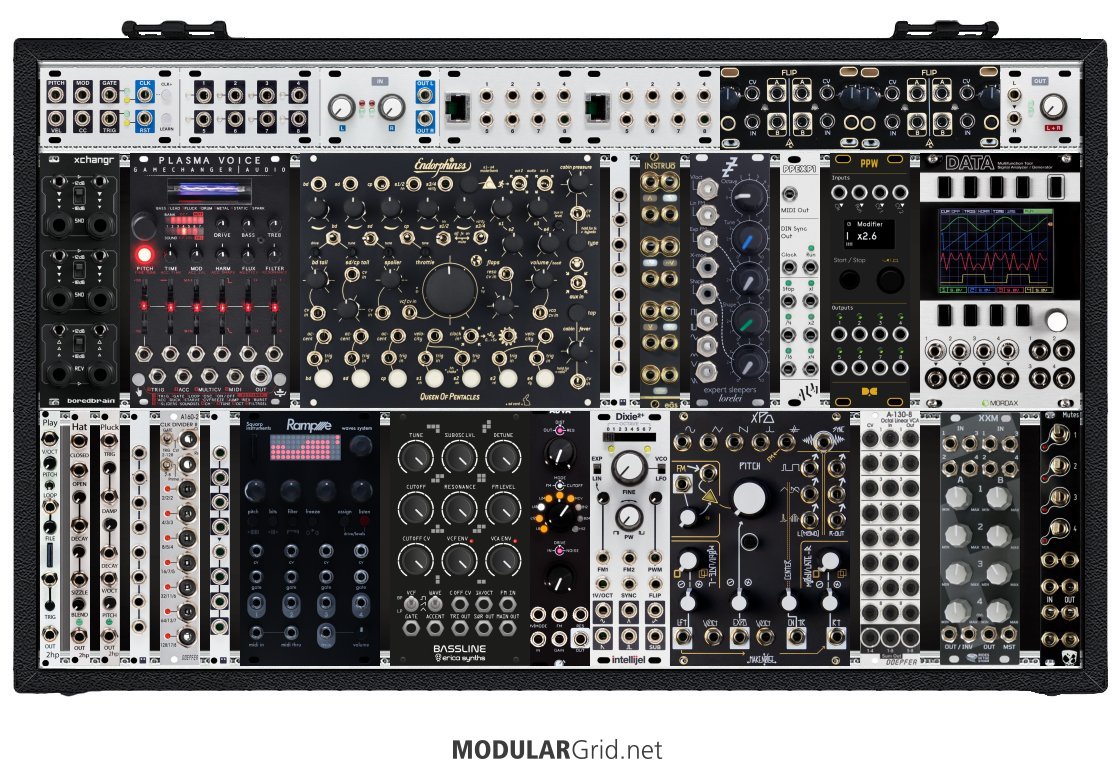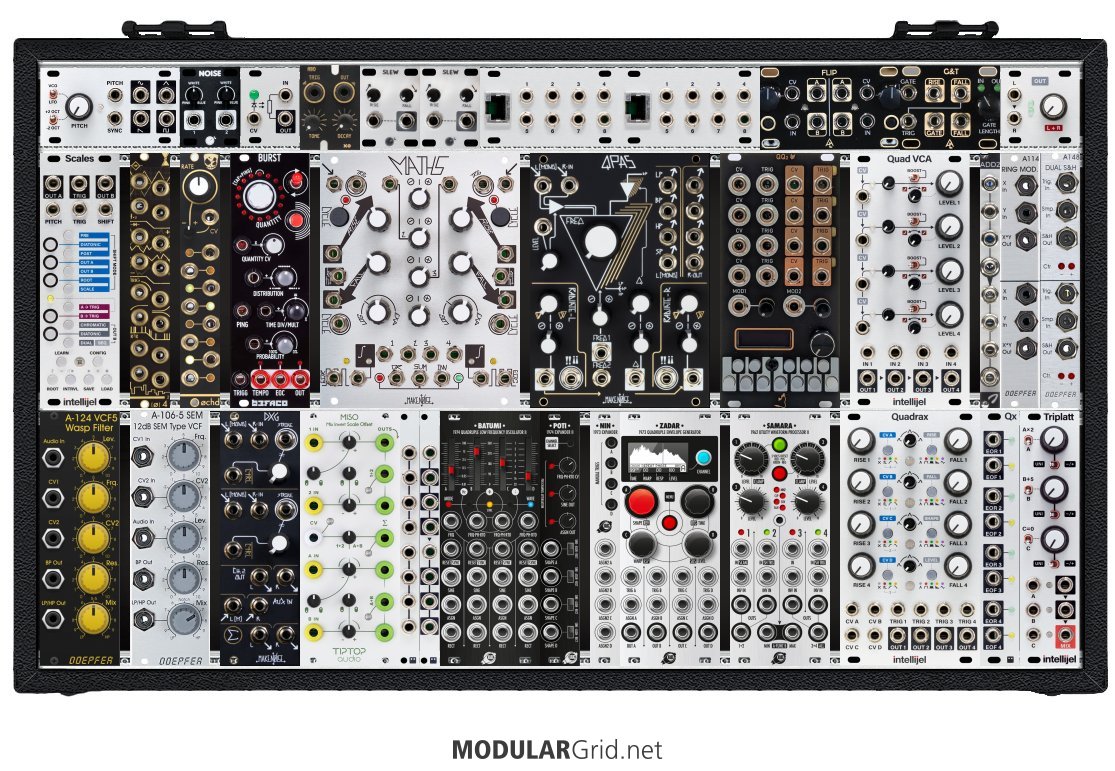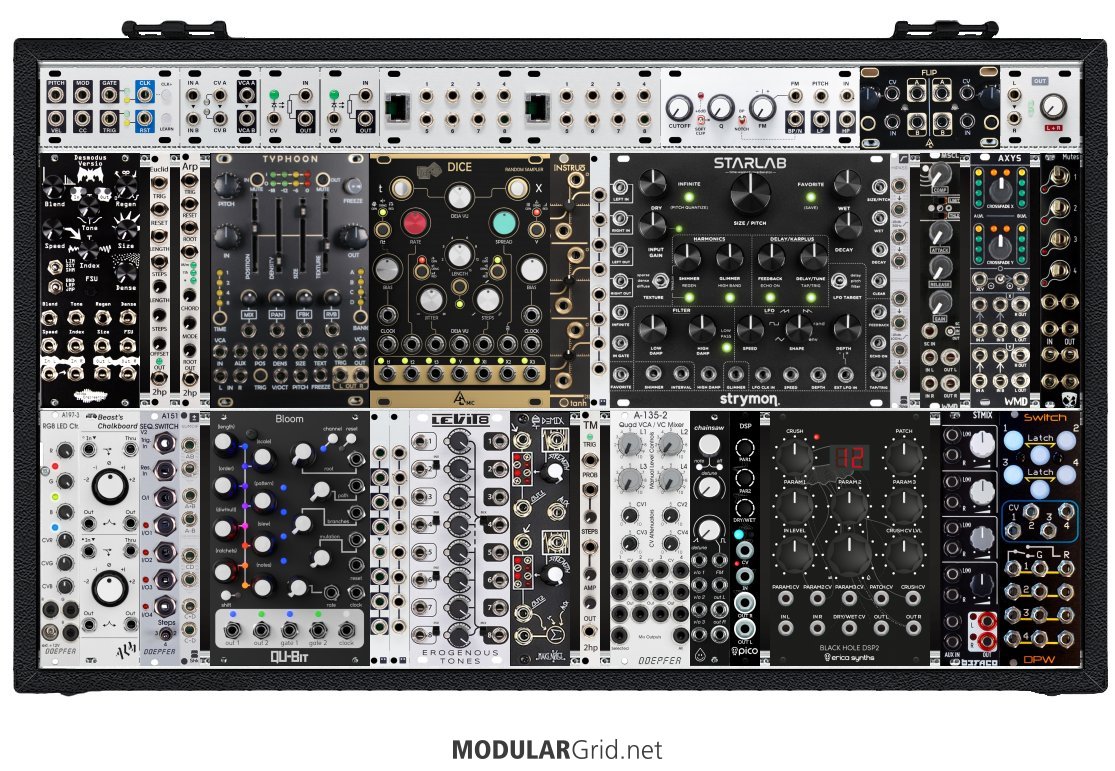So I guess this is the common "Hey I'm new, looking for opinions on my rack" post. I know this is a long post and the rack is a lot to digest, but I would be most appreciative of anyone who had the time/desire to look through it.
Here's the breakdown of what I own, what I'm looking to get, and what I'm looking to do with it:
Gear I already own:
Prophet REV2 synth
Maschine mk2 and S88 keyboard (extensive NI Komplete suite)
Various guitar pedals
Various rackmount FX and utilities
Keith McMillen 12 Step2 MIDI Bass Pedal Foot Controller
TASCAM 24chan Mixer/Recording Console
Gear I'm planning to get:
All the modules shown in the 3 racks
3 Intellijel 7U 104HP cases
Boss 505 mk2 desktop looper
Beatstep Pro
OXI One MIDI/CV Sequencer
Wasp desktop synth
The obvious thing to tell someone new is to "start slow, learn and build gradually", and I do understand the merits of this and completely agree with it. However as much as I would like to be able to do it that way... I will simply (and vaguely) say that I do have some very compelling reasons not to follow this sound advice (and leave it at that).
Here is what I'm looking to accomplish with my rack:
1) Be able to have fun/entertain myself.
2) Create Ambient/generative scoundscapes as well as melodic tracks, scores, songs, and pieces. (Sometimes played live, sometimes sequenced)
3) Create tracks you can zone out to, meditate to, dance to, and even tracks you can stagedive to.
4) I want to have enough real estate that I can work on a "main patch" and still have room/modules to create something totally separate without having to unpatch something else to do it. (Partly to just experiment with layers to add into the main patch, but also to be able to "take a break" from the main patch and spend time doing some exploring or deep dives in learning and exploring the nuances of other modules before returning to the main patch I was working on.)
5) I plan to create self generative tracks as well as play the rack live. It will also be used to compliment other aspects of my music projects outside of the rack.
While I grew up on old school arcade sounds and C64 games, I'm looking to mainly create stuff that is more of "a song" rather than something that sounds like an Atari 2600 game soundtrack. So I'm assuming I need to look into filtering a bit more because I'm not really looking to make "beeps and blips" sort of tracks. Also, I'm not into techno style stuff, but it's hard to describe the vision in my head because I've never heard anyone else make music in the main style I'm looking to create. (Picture Frank Zappa, The Beach Boys, Black Flag, Vangellis, Rush, The Dead Milkmen, Kraftwork, Black Sabbath, Devo, Yes, and the Ramones all mixed into one.)
I'm new to modular, but not new to creating music. My Rev2 synth is great and I've had it for several years now, but the problem has always been that the "patching is hidden", and I tend to work MUCH better visually. If I can't see the pathways, I don't always get a clear grasp of the signal flow or what is going on, leaving me to generally not stray far from the presets. (Also there's a bit too much menu diving on it for my taste.) I will say that I do love the feel of the keybed on this piece of gear.
Being new at modular, I'm sure there's things I'm overlooking or perhaps even misunderstanding. However, for the most part, if I know what it is that I don't adequately understand, I typically try to research it and get a better grasp. (For instance, I have already read the manuals for all of the modules in the rack). But my problem is likely this: "I don't know what I don't know". (That makes it impossible to research without it being pointed out to me. So that is part of the reason for this post.)
Here's some thoughts behind what I have in mind:
For cases, I picked three Intj 7u 104hp cases each outfitted with a pair of 1U Octalinks to route each case to the others. That way I can just pull the 3 CAT cables off to be able to put the case lids on without having to unpatch everything. The 3 cases will normally be set next to each other, but one will eventually be configured as a traveling case (That's one of the reasons for some of the redundancy in module selection).
For outputs, I have 3 Intj stereo outputs to go to the mixer/recorder console. The Xchangr module also gives me a stereo FX loop (or 2 mono ones). Plus an additional stereo output for a tuner and vocoder pedal. (So in total, I would have the ability to output 6-10 channels to the recording console simultaneously)
The 1U Flips seem quite useful and I can see multiple ways I'll use them throughout most of my patches.
I will also make good use of quantizer and arpeggiators as I am looking to do mostly melodic stuff. (I am feeling like another quantizer might be a good idea, but I figured I'd wait and see, and then I'd have a better idea what I like/need after putting in some time on the rack.)
I have a strong dislike for small displays, non-full sized keyboard keys, and menu diving.
I have zero interest in VCVRack, I've stared at computer monitors since the early BBS days and now my sore eyes require time away from a screen.
I'd like to do most of the mixing onboard, but everything will be outputted to my 24 track console where any final tweaks can be made.
I plan to use a Boss 505mk2 to add vocals and for some basic sampling duties. (Though I'm not set on the best way to integrate it into the rack to get maximum functionality from it.) The Rample sampler would be used for traditional drum samples, the Queen of Pent for 909 style, and the 2hp Play for vocal oneshots, callouts, and FX.
As for MIDI, since I plan on being able to split the rack to have part of it be a traveling rig, I went with multiple MIDI modules (and to take advantage of the built-in jacks in the cases). I've never been a huge fan of MIDI and always thought it felt "a little clumsy". While I have had "use for" it over the years, I simply never had a "definitive need" for it, so I have mostly avoided using it in the past. However today is a different story... the MIDI devices I would using with the rack are:
Beatstep Pro
OXI One MIDI/CV Sequencer
Wasp desktop synth
Boss 505 mk2 desktop looper
K.M. 12 Step2 MIDI Bass Pedal
I also will possibly be getting a basic MIDI keyboard as well. Would a 5th or 6th MIDI device mean I would need another MIDI module? Or only if I was trying to use them all at the same time? I'm wanting to hook everything up at once and not have to constantly unplug stuff when I want to use something. I'm not sure that the modules I have selected are adequate for what I'm looking to connect MIDI-wise. Any advice in this area would be helpful.
Once I get a better grasp of everything and get enough playtime under my belt, I will be looking into heading into a quadraphonic direction (and eventually possibly into octaphonic territory) I already have seen a few modules that would compliment that aspect, though I'm not worried about addressing any of that at this point in time as that's far down the road at this point, but figured it was worth mentioning.
The racks are not currently laid out exactly how I would position all of the modules (obviously that is a constant changing work in progress for most people). I'll need to get a better idea of what I use the most and which modules work well or compliment each other before I have a better idea of the flow and layout I want. Though I'll likely end up positioning modules more for accessibility reasons more so than a left to right signal flow layout. I did intentionally leave some spaces between many modules for ease of finger access (until at some point new acquisitions gobble that space up).
So is there anything obvious (or not so obvious) that I have overlooked? Utility modules? Basic functionality modules? Ease of use stuff? Something missing? Something that's exceedingly overkill? Any (helpful) thoughts, opinions, suggestions, questions, or comments would be welcome.




